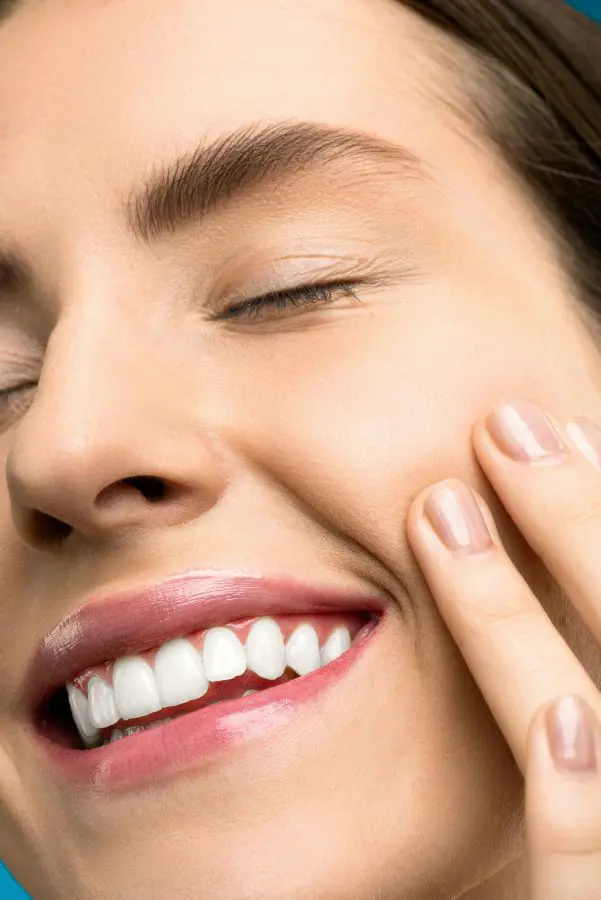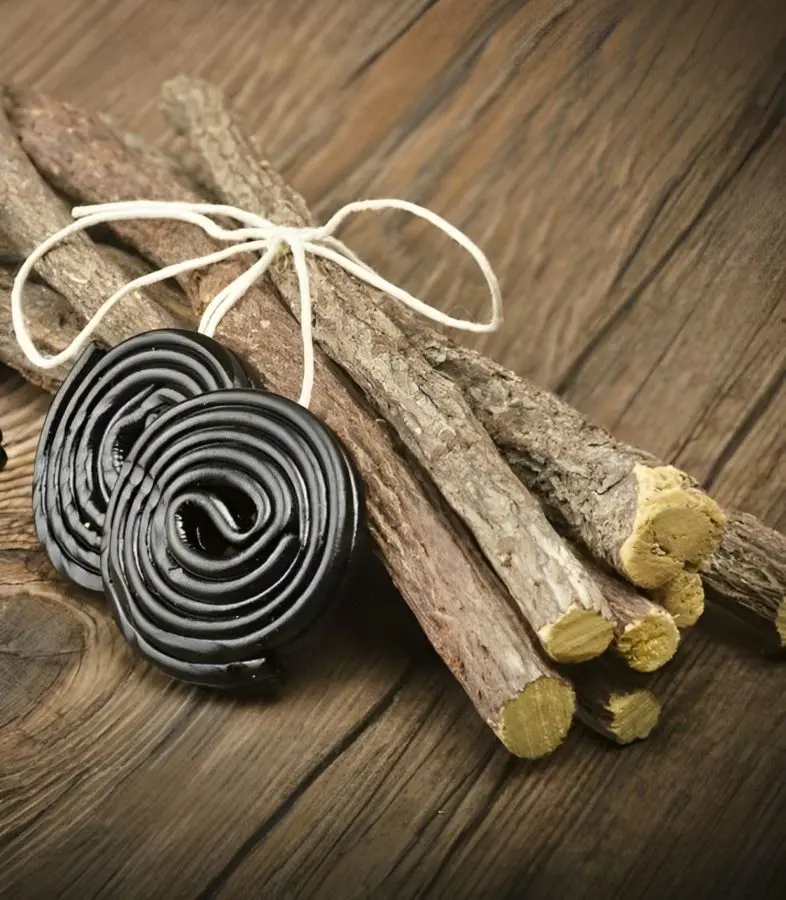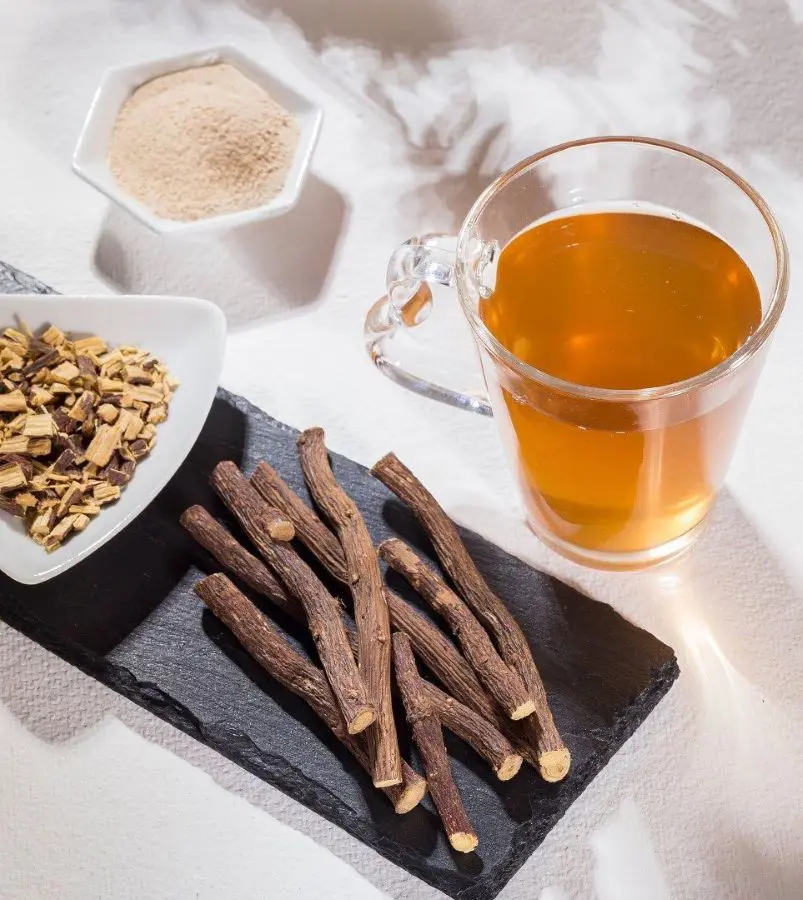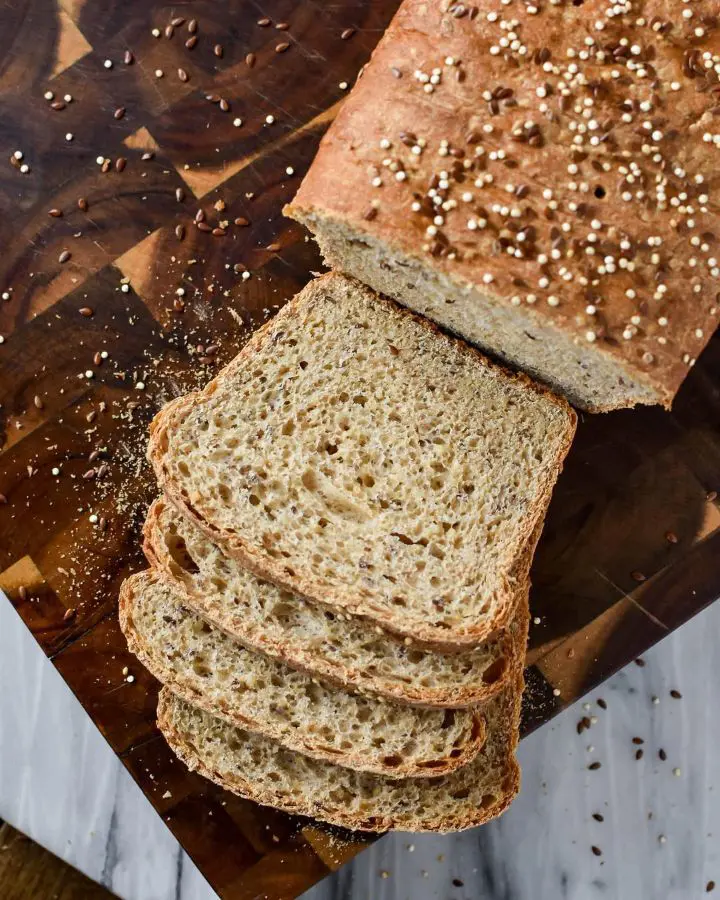Liquorice Root: Benefits And Uses

This post may contain affiliate links. If you make a purchase through links on our site, we may earn a commission.
You can spell it liquorice or licorice; this herb or root has been in use for centuries in most medicinal applications, as a natural sweetener and to enhance flavors. Regarding its origins, it comes from the root of the "Glycyrrhiza galbre" plant and is widespread in different regions of Europe, Asia, and the Middle East.
Apart from its traditional uses in cooking and medicine, this root has gained popularity for its health-enhancing and healing qualities. In this article, you will explore how liquorice roots function, their advantages, applications, and safety considerations.
What Is Liquorice Root?
Liquorice is known as a dried root that comes from a plant called Glycyrrhiza glabra. This plant is an herbaceous plant that comes from the legume family which is native to Southern Europe and Asia. For well over 4000 years, this incredible root has been used as an herb, culinary practice, and even a sweet treat. In Greek, The plant's scientific name Glycyrrhiza glabra means "sweet root" and its sweetness shows that it honestly lives up to its name!
Liquorice root was very favored in ancient Egypt and some were even found in King Tutankhamun's tomb. For many centuries, Chinese medicine has used it to treat many illnesses, and Greek and Roman doctors praised its healing abilities. This small woody root has been there throughout history right from Alexander the Great campaigns to current health clinics.
Nutritional Components of Liquorice Root
No doubt, Licorice root has many good things in it, like:
- Glycyrrhizin: It has antioxidant, anti-inflammatory, and immune-boosting properties.
- Flavonoids: Antioxidants that fight free radicals.
- Coumarins: Natural blends with antibacterial effects.
- Polysaccharides: Support gut health and immunity.
- Phytoestrogens: Benefit balance hormones.
Types of Liquorice
Liquorice comes in several delightful varieties that'll make your mouth water and your curiosity spark:
- Black Licorice: It has a distinct, strong taste that many either love or hate. This type is often sweetened with glycyrrhizin, which is significantly sweeter than sugar. This variety is commonly found in candies, lozenges, and even some beverages. It's particularly popular in Europe.
- Red Licorice: Unlike black licorice, red licorice doesn't actually contain any licorice root. Instead, it is typically flavored with fruity tastes like strawberry, cherry, or raspberry. Often seen in the form of twists or ropes (like Twizzlers), red licorice is sweeter and more appealing to those who find black licorice too strong.
- Salty Licorice: Known as 'salmiakki' in Scandinavian countries, salty licorice combines the sweetness of traditional licorice with a salty flavor derived from ammonium chloride. This type has a unique taste that can be quite polarizing. This type is especially loved in countries like Finland and the Netherlands, where it's often enjoyed as a snack or used in various desserts and even alcoholic drinks.
- Sweet Licorice: In some regions, particularly Scandinavia, what Americans refer to as black licorice is considered sweet licorice. This type emphasizes sweetness over the more bitter notes of typical black licorice. Sweet licorice can include soft candies and toffees that have a mild flavor and are often enjoyed by those who prefer a less intense taste.
Health Benefits Of Liquorice Root
We must say liquorice is rewarded with several health benefits, which are:
1. Digestive Health

Possibly the most known advantage of liquorice root is its ability to promote good digestive health. Because of its natural anti-inflammatory properties, it can help manage upset stomachs, heartburns, acid reflux, and even stomach ulcers. Glycyrrhizin stimulates mucus production in the gastric mucosa and helps avoid the formation of ulcers. Also, it has been demonstrated that liquorice can eliminate 'Helicobacter pylori', a bacterium that is associated with peptic ulcers.
How to Use:
- Tea: Steep dried licorice root in hot water for about 10 minutes.
- Supplements: These are available in capsules or extracts; follow the dosage instructions on the package.
2. Respiratory Support
Liquorice root is known to help ease the symptoms of respiratory disorders. It has an expectorant effect and is good for treating coughs, bronchitis, and many other upper respiratory tract infections. Liquorice also has disinfecting abilities, which effectively treat all sorts of respiratory system infections.
How to Use:
- Syrup or Lozenges: Look for products that contain licorice extract to help with throat irritation.
- Gargle: Dissolve licorice powder in warm water and gargle to relieve throat discomfort.
3. Anti-inflammatory Effects
Different studies show that liquorice root has an anti-inflammatory effect and can, therefore, be used to treat inflammatory-related illnesses. They include cures for inflammation of the stomach, and for skin-related issues such as eczema and psoriasis due to its ability to help the skin calm down from irritation. As a result of mediating inflammation responses, it can be used as an active component in the manufacture of skincare products meant to minimize redness and inflammation.
4. Antiviral Properties
Studies have also suggested that liquorice root has a direct virucidal effect on destroying the herpes simplex virus, hepatitis B and C. This makes it a possibly useful addition to traditional medicine in treating viral infections.
5. Skin Health

Liquorice root is used in the preparation of skin lotions because it has calm and illuminating effects. It is also used to treat skin conditions like eczema, rosacea, and acne. Plus, it works to decrease redness and inflammation of the skin. Further, it can reduce the problem of hyper-pigmentation such as melasma by regulating melanin production.
How to Use:
- Topical Creams: Look for skincare products that list licorice extract as an ingredient.
- DIY Paste: Mix licorice powder with water to form a paste and apply it to affected areas.
6. Hormonal Balance
This beneficial root may enable one to control the hormonal balance in the body especially those women experiencing menopausal or irregularities in their menstrual cycles. It has been suggested that liquorice can mimic estrogen effects, potentially alleviating symptoms associated with hormonal fluctuations.
7. Weight Management
According to different research, this herb may help in the process of weight loss by decreasing body fattening without adjusting the diet or increasing physical activities. A study on compounds like glycyrrhetinic acid confirmed that taking liquorice reduces body fat percentages.
How to Use:
- Supplements: Consider taking licorice supplements specifically formulated for weight management.
8. Oral Health
Liquorice root can be beneficial for oral health by helping to manage mouth sores and dental plaque due to its antimicrobial properties. Applying a paste made from liquorice powder can provide relief from mouth ulcers and improve overall oral hygiene.
How to Use:
- Take a small piece of dried licorice root and chew it slowly. This allows the beneficial compounds to come into contact with your teeth and gums.
- Look for mouthwashes that list licorice extract as an ingredient. Rinse your mouth with it regularly, following the instructions on the bottle.
- You can have licorice tea also, as it supports the oral health. The tea can help soothe the throat and gums while providing antioxidants that protect against oral diseases.
9. Liver Health

Licorice root may support liver function by helping to detoxify the liver and protect against damage from toxins. Studies have shown that it can reverse liver damage caused by certain chemicals due to its antioxidant properties.
How to Use:
Regular consumption of liquorice root tea may support liver function.
10. Fatigue Relief
This root is believed to enhance energy levels and combat fatigue due to its adaptogenic properties, which help the body manage stress more effectively. This makes it a popular choice for those looking to boost their stamina during demanding periods.
11. Men's Health
In traditional medicine, liquorice has been used to improve sperm count and address male infertility issues due to its aphrodisiac properties. Its ability to balance hormones may also contribute positively to men's reproductive health.
12. Acts as a Natural Sweetener

Liquorice root is well known because of its sweetening property which is 50 times sweeter than sugar. This makes it an attractive substitute for sugar in other food products, sweets, and drinks. Unlike sugar, it offers additional health benefits which we discussed above making it a better option as a sweetener than sugar for those with diabetes or concerns of excessive sugar intake.
Note: In case one wants to consider any supplement that has liquorice in its content they were advised to seek medical advice first.
Uses Of Liquorice Root
Liquorice root can be consumed in various forms:
- Teas: Liquorice root can be eaten in numerous methods but an easy way of preparing it is by making tea. It only takes a few minutes to boil a piece of dried liquorice root in hot water.
- Powder: Typically, liquorice root can be chewed and eaten raw as flakes, added to a smoothie, or can be used for sweetening dishes.
- Extracts: Supplements of liquorice are easily accessible in the market and can be purchased as liquids that may be ingested as is or dissolved in water.
- Topical Applications: Liquorice extract, because of the skin-calming effect, is often included in skincare products aimed at treating acne or pigmentation issues.
- Culinary Applications: You can use these roots in different candies, beverages, and even desserts. Besides, it gives a different taste to teas, herbal mixtures, and savory food items.
Side Effects Of Liquorice

Liquorice root, while often praised for its health benefits, can also lead to several side effects, especially when consumed in large amounts or over extended periods. Here are some side effects of this root:
- High Blood Pressure: Consumption of too much liquorice root increases the risk of high blood pressure. This indeed occurs since liquorice contains a compound that hardens the heart due to its ability to make the body hold sodium and expel potassium causing hypertension.
- Low Potassium Level (Hypokalemia): Consuming high amounts may lead to hypokalemia or low potassium levels that in turn lead to weakness of muscles, tiredness, or irregular heartbeat.
- Edema: This means liquorice may cause swelling due to fluid retention. Some of the early signs that people may experience due to the use of excess liquorice include puffiness, especially on the legs or face.
- Fatigue and Lethargy: Some people may feel tiredness or lack of energy.
- Heart Issues: In severe cases, high consumption is known to cause effects that include heart failure or irregular heartbeat.
- Kidney Problems: Licorice can worsen kidney function, particularly in individuals with pre-existing kidney issues.
Recommendations
To minimize risks:
- Limit consumption of licorice root products.
- Avoid using it if you have high blood pressure, kidney disease, or heart conditions.
- Consult a healthcare professional before starting any new supplement containing licorice, especially if you have underlying health issues.
Who Should Avoid Liquorice Roots?
Keep in mind, that this root may not be applicable to everyone. Licorice is dangerous to pregnant women; it can cause premature birth and other issues. Plus, it will be better if you avoid it in the breastfeeding phase as well.
Similarly, Liquorice makes it react with different medications particularly those that treat hypertension and corticosteroids. If you are on those medications it is advisable to seek medical advice.
In addition, this root has been shown to interact with several medications, like:
- Blood pressure medications
- Diuretics
- Blood thinners
- Cholesterol-lowering medications
- Estrogen-based contraceptives
- Nonsteroidal anti-inflammatory drugs (NSAIDs)
If you are using any of these medications, it will be advisable to refrain from using licorice root products without consulting your doctor.
Dosage and Forms of Liquorice Roots
Of course, this useful root can also be purchased and consumed fresh or dried. But if you are thinking of using its supplements, they come in several forms, such as:
- Capsules
- Powders
- Tinctures
- Topic gels
- Teas
Now you may have one question of interest, what dose of licorice root is safe per day? The lack of scientific data does not permit defining the proper dosing regimen at present. But some research suggests that doses differ depending on what type of liquorice root is used and the health condition being treated. For instance, two 380 mg Deglycyrrhizinated Licorice (DGL) tablets before meals are recommended for GERD.
If you are an asthma patient then:
- 1-5 grams of dried licorice root powder, three times daily
- 2-5 milliliters of licorice tincture, three times daily
- 250-300 mg of licorice extract, three times daily
Note: To be safe, do not exceed 100 mg of glycyrrhizin per day (again, speak to your doctor first).
Recent posts
Nutrition
Nutrition
Is Ramen Healthy? Here's What Dietician Says
Ramen is a traditional dish from Japan that in the recent era has become a global phenomenon. This beloved and comforting soupy dish however has been questioned, when it comes to its nutrition. Best for those looking for a quick (instant), affo...
Nutrition
Is Wheat Bread Healthy? An Expert Picks
Wheat bread has been proudly celebrated as a dietary staple in countless homes for as long as people can remember. It has earned a reputation as a healthier alternative to white or any other processed bread, that no one can deny. Because of its evide...
Nutrition
Is Sausages Healthy? Nutrition And Health Benefits
Sausages are tasty in an addictive way, making them one of the most popular foods worldwide. You may have enjoyed this convenient food often, whether on a bun with mustard or grilled on a barbecue, the simple preparation methods are what makes its co...
Nutrition
Ice Cream Benefits: Nutrition, Potential Risks And Best Choices
Not gonna lie, ice cream is often taken as a guilty pleasure treat, a delightful treat that takes you to cloud nine but is frequently associated with negative health implications. Nonetheless, the happy news is when devoured mindfully, ice cream can ...
Nutrition
Is Sushi Healthy? Some Good and Bad Choices
Sushi is a wholesome meal and a beloved Japanese dish. The traditional sushi recipe is a simple combination of fresh fish, vegetables, and vinegared rice which is popular for its minimalistic preparation. As with any food, there are factors that dete...
Nutrition
16 Benefits Of Coriander That Will Surprise You
Abundant in nutrients and antioxidants, coriander is an annual herb with a characteristic aroma that is extensively used around the world. Both coriander leaves (also called cilantro) and seeds are used in various cuisines around the world. Known fo...







